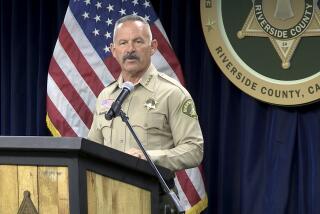Law Enforcers Applaud Bush Speech
- Share via
Local law enforcement officials Tuesday applauded President Bush’s drug strategy, calling it “tough” and “balanced,” and expressed optimism that San Diego will get its fair share of federal dollars to stem the flow of drugs coming across the U.S.-Mexican border.
San Diego Police Chief Bob Burgreen, whose street forces patrol a border area in San Ysidro and other older residential areas where crack cocaine and other illicit drugs have proliferated, said he is particularly pleased with Bush’s call for stricter enforcement of the laws.
For the record:
12:00 a.m. Sept. 7, 1989 For the Record
Los Angeles Times Thursday September 7, 1989 San Diego County Edition Metro Part 2 Page 2 Column 1 Metro Desk 2 inches; 53 words Type of Material: Correction
The Times reported incorrectly Wednesday that U.S. Atty. William Braniff said President Bush had failed when Bush, as vice president, was put in charge of the Reagan Administration’s war against drugs in 1982. That evaluation of Bush’s performance should have been attributed to critics of the Reagan anti-drug strategy. Braniff supports the Administration’s drug program.
“He touched on four important areas, and his first was a need to enforce the law. I was pleased with his tough stance on enforcing the law. I was also pleased with his stance on zero tolerance for casual drug users. These two areas are crucial for local law enforcement officers,” said Burgreen.
U.S. Atty. William Braniff, the top federal law enforcement official in San Diego and Imperial counties, said he was pleased with Bush’s plan to prosecute drug users, not just dealers. Braniff lauded the President’s drug strategy as a “balanced plan to attack drugs at all levels,” and, like Burgreen, supported Bush’s call for zero tolerance.
Zero tolerance, a tough and uncompromising plan to deal with casual drug users and dealers alike, was pioneered by Braniff’s predecessor, Peter K. Nunez.
“A significant part of the program dealt with user accountability. . . . I believe that users are the ultimate source of the problem and must be the ultimate solution of the problem,” said Braniff.
Need for Interdiction
But still unclear is how local law enforcement agencies will benefit from Bush’s proposal to give local law enforcement across the nation $350 million to combat drugs at the street level.
“I hope we get our fair share,” Burgreen said. “I don’t see any way that this area of the country can be ignored, with our problems at the border and the growing drug menace in our neighborhoods. . . . I was also pleased with the President’s comment on the need for interdiction. I would hope that would include doing something to make our borders secure.”
In May, Mayor Maureen O’Connor declared a “state of emergency” in San Diego and asked Gov. George Deukmejian for $34 million to fight street crime, most of which was blamed on street gangs and drugs. Deukmejian brushed aside O’Connor’s request, but the two are scheduled to meet later this month to discuss the city’s crime and drug problems.
On Tuesday, O’Connor said she hopes Washington will target San Diego as a “key city with unique circumstances” and make available enough money to make a difference in the city’s war against drugs. Under this approach, the federal government “would concentrate added resources” in San Diego, she said.
Bush said his plan to make $350 million available to local law enforcement officials to battle drugs represents more than a 100% increase in the funds now available. According to O’Connor, San Diego received only $1 million in federal funds for law enforcement last year.
“What I heard tonight, if I take it as a literal interpretation, that would mean we would only be getting $2 million. I hope that’s not the case. . . . I would hope they (Washington) would have the same sense of urgency for San Diego that they have for other cities and Bogota, Colombia. People are also being killed here. . . . We also have a major drug problem,” O’Connor said.
Push for Jail Funds
Both O’Connor and Burgreen said they will push to get some of the $1.6 billion that Bush earmarked for new jails. The mayor and chief said that San Diego County has the most crowded jail system in the country and hope that Washington will take notice of this and make money available to build a new jail.
Braniff credited “the public attitude” for Bush’s new push in the drug war. Although, Braniff said, Bush failed when, as vice president, he was put in charge of the Reagan Administration’s war against drugs in 1982, the new fight will succeed because the President appears to have public support this time.
“The most important ingredient is the public attitude that something has to be done this time. The public realizes that drugs are a problem that spares no one. We’re all at risk,” said Braniff.
More to Read
Sign up for Essential California
The most important California stories and recommendations in your inbox every morning.
You may occasionally receive promotional content from the Los Angeles Times.










